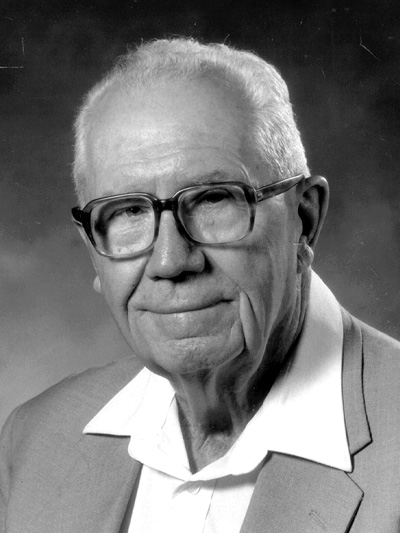
Robert D. Sweet (MS CALS ’38, PhD CALS ’41) died January 30, 2014, at his residence in Jacksonville, N.Y., just shy of his 99th birthday. The emeritus professor and former chair of the Department of Vegetable Crops (a precursor to the Department of Horticulture) “was among the first generation of weed scientists and a giant in vegetable crops at Cornell after World War II,” says Steve Reiners, associate professor in the Department of Horticulture.
“Bob was a very accomplished weed scientist and supporter of all things horticultural,” says Marvin Pritts, chair of the Department of Horticulture. “He was active in the department well after his retirement and did not hesitate to share his opinions with me, or the dean, or the university president. He did not suffer fools gladly when it came to issues that involved science and agriculture, or university politics.”
“Bob was one of our founding members and a true legend in the field of weed science,” says Greg Armel, president of the Northeast Weed Science Society (NEWSS). Bob was the Society’s second president, serving in 1949 and 1950, received the NEWSS Award of Merit in 1975 and became a NEWSS fellow in 1979. “In fact, his name became so synonymous with NEWSS service and student education that our NEWSS graduate student award shares his name,” adds Armel.
Bob was also very active in the Weed Science Society of America, serving as WSSA’s first business manager and first editor of the journal Weeds. He was named a WSSA fellow in 1974.
“Anyone who knew Dr. Sweet well will remember him as a great scientist, teacher, and friend. He was intelligent, engaging, kind, respectful, and thoughtful toward others. He was not afraid to champion causes and did so with great passion and respect. He was in short a true gentlemen and pioneer in the field of weed science and he will be missed by all who knew him, says Armel.
I briefly shared an office with Bob when I started working at Cornell in 2000. I knew him as the father of herbicides in vegetable crops, and I asked him how he got started on that road. Before World War II, he explained, farmers relied almost exclusively on mechanical cultivation to control weeds in vegetable crops. But with the war, there was a shortage of farm labor to drive the tractors to pull the cultivators to kill the weeds, and farmers were resorting to untried chemical methods that were neither particularly safe nor effective. Bob’s contribution to the war effort was to apply science to figure out how to adapt herbicides used on grain crops to control weeds in vegetables. It was his way of fighting fascism.
“Bob was lucid, engaging and caring right up until the end,” says Pritts, who visited Bob the Sunday before he died. “He was a real character in the best sense of the word, and those of us who knew Bob will miss him greatly.”
–Craig Cramer


